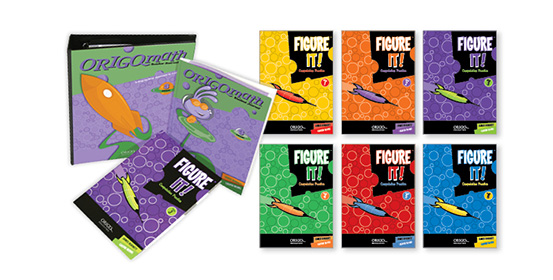Insights
Building Computational Fluency to Support Math Success
In elementary math education, computational fluency is a cornerstone of long-term student success. It empowers students not just to calculate accurately and efficiently, but also to approach problem-solving with confidence and flexibility. When students are fluent in basic operations, they can focus more energy on understanding new concepts rather than being bogged down by simple arithmetic.
Yet fluency isn’t something that comes automatically with repeated exposure—it must be intentionally developed through a blend of strategies, practice, and meaningful engagement. Read on to learn why computational fluency is so important, practical strategies for building it through remediation and intervention, and two powerful resources from ORIGO Education that can help support this goal.

Why Computational Fluency Matters for Understanding and Application
Computational fluency is about more than memorizing math facts. It involves three key components: accuracy, efficiency, and flexibility. Fluent students can solve problems correctly, choose appropriate strategies, and apply them across different contexts.
One study by Hyman Bass explains that computational fluency isn’t just about getting the right answer—it’s about understanding how and why math works. Bass highlights that fluency grows best when students also build strong number sense, reasoning skills, and confidence, because all parts of math proficiency work together, not separately.
Similarly, in Computational Fluency: The Key to Multiplicative Success, Bethany Lloyd emphasizes that computational fluency helps students build a strong foundation for understanding multiplication and solving more complex math problems. She explains that students who develop fluency early on are better equipped to use strategies and known facts flexibly, while students who lack fluency often struggle to engage in higher-order thinking.
In programs like a summer math intervention, building fluency is a smart and necessary focus. With fewer curriculum demands, educators can dive deeper into helping students strengthen these core skills in fun and effective ways—setting them up for success in the upcoming school year.

Summer Is Key to Retaining and Improving Math Skills
Each year, students face a familiar challenge: summer learning loss—often called the summer slide. Research shows that without regular practice, many students lose two to three months of math knowledge during summer break, and the effects are more pronounced in math than in reading.
Why? Because math skills are highly sequential and procedural. Students need frequent opportunities to rehearse and apply what they’ve learned to maintain mastery. When these opportunities disappear for two or three months, skills can fade fast—especially in the early grades.
Preventing the summer slide isn’t just about keeping students busy—it’s about using that time to reinforce number sense, fact fluency, and mathematical thinking in engaging, meaningful ways. Whether through at-home practice, tutoring, or participation in a structured summer math program, providing consistent access to quality math experiences helps ensure students return in the fall confident and ready to learn.
Practical Strategies to Build Fluency Through Remediation and Intervention
To effectively support students in developing computational fluency, educators need a two-pronged approach: remediation and intervention. While both aim to strengthen skills, they serve different purposes and require tailored strategies.

Remediation: Rebuilding the Foundation
Remediation focuses on reteaching core skills and concepts students may have missed or misunderstood. It’s particularly important for students who have large learning gaps or who need extra time and support to master key content.
Effective remediation strategies:
- Concrete-Representational-Abstract (CRA) Approach: Start with hands-on manipulatives (concrete), then move to drawings or models (representational), and finally to numeric symbols (abstract). This helps students build conceptual understanding before they’re expected to work with numbers alone.
- Use Number Talks: Incorporate short, daily number talks that allow students to mentally solve problems and explain their thinking. This encourages multiple strategies, improves flexibility, and builds a positive math mindset.
- Practice with Visual Models: Tools like ten frames, number lines, and base-ten blocks help students visualize quantities and operations, making abstract concepts more accessible.
- Small-Group Instruction: Provide targeted instruction in small groups based on student data. This allows for more focused practice and personalized feedback.

Intervention: Strengthening Skills Through Targeted Support
Intervention goes beyond re-teaching; it identifies specific skill deficits and provides systematic, short-term instruction to help students catch up. High-quality interventions are typically more intensive, occur more frequently, and use data to drive decision-making.
Effective intervention strategies:
- Diagnostic Assessments: Use quick, formative assessments to pinpoint exactly where students are struggling—whether it’s with place value, number facts, or understanding operations.
- Repeated Strategy-Based Practice: Rather than rote drills, focus on helping students understand and apply strategies like doubles, near doubles, and making tens. This supports long-term retention and flexible thinking.
- Game-Based Learning: Incorporate math games that reinforce fact fluency through fun, low-pressure competition. Games like Math Fact War, Bingo, or Roll & Solve make repetition engaging and effective.
- Progress Monitoring: Regularly track student progress and adjust instruction based on what’s working. Fluency isn’t built overnight—it takes consistent, intentional effort.
Build Computational Fluency with ORIGO
ORIGO Education offers research-based resources designed specifically to build strategy-based fluency, not just memorization. Two standout tools for K–6 educators are:
The Book and Box of Fact Strategies
This comprehensive resource focuses on teaching strategies—not just answers. It helps students understand how to use number relationships to solve problems efficiently, accurately, and flexibly.
Key features include:
- Visual models that help students grasp key strategies like doubles, near doubles, and bridging to ten.
- Hands-on tasks and practice activities that emphasize understanding over memorization.
- Flexible design for small-group use, interventions, or stations during rotations.
- Teacher guides that support planning and implementation at any grade level.
The Book and Box of Fact Strategies is perfect for building fluency with all four operations and supports students as they move from conceptual understanding to confident application.
ORIGOmath
ORIGOmath provides a rich library of concept-focused lessons designed for intervention, enrichment, or whole-group instruction. Organized by content strand and grade level, it gives educators access to targeted lessons with built-in supports.
Highlights of ORIGOmath include:
- Ready-to-go lesson plans that integrate visual models and verbal reasoning.
- Differentiated tasks that support diverse learners.
- Alignment to standards for easy planning and integration into existing curricula.
Together, these resources give educators the tools they need to develop computational fluency in a way that supports true understanding.
Computational fluency is a key building block for math success. When students develop fluency, they’re more likely to feel confident, persist through challenges, and apply their learning in meaningful ways. Whether you’re teaching during the school year or working in a summer math program, intentional fluency-building strategies—especially through remediation and intervention—can make a powerful difference.
By combining strategy-based instruction with hands-on practice, math games, and high-quality resources like those from ORIGO Education, educators can help every student become a fluent, confident math thinker.
Planning an elementary summer math program? Check out this post with evidence-based resources on how to make your summer math program the most successful!





